College Football Playoff expansion: How every CFP would look with 12 teams

College Football Playoff expansion is off the table — for now.
The powers that be were unable to agree on an expanded playoff in time for the 2023 season, which means we'll probably see a four-team event until at least 2026.
But with all the benefits that come from expansion — namely, an enormous pile of cash for every school and TV network involved — we should see more teams added to the playoff system eventually.
How many? Some speculation is centered around a six-team playoff, while others are centered around eight teams. But the broader consensus is that a 12 team format is the way forward for the CFP.
What would the event have looked like in years past with a dozen teams on the field?
First, here's the proposed format
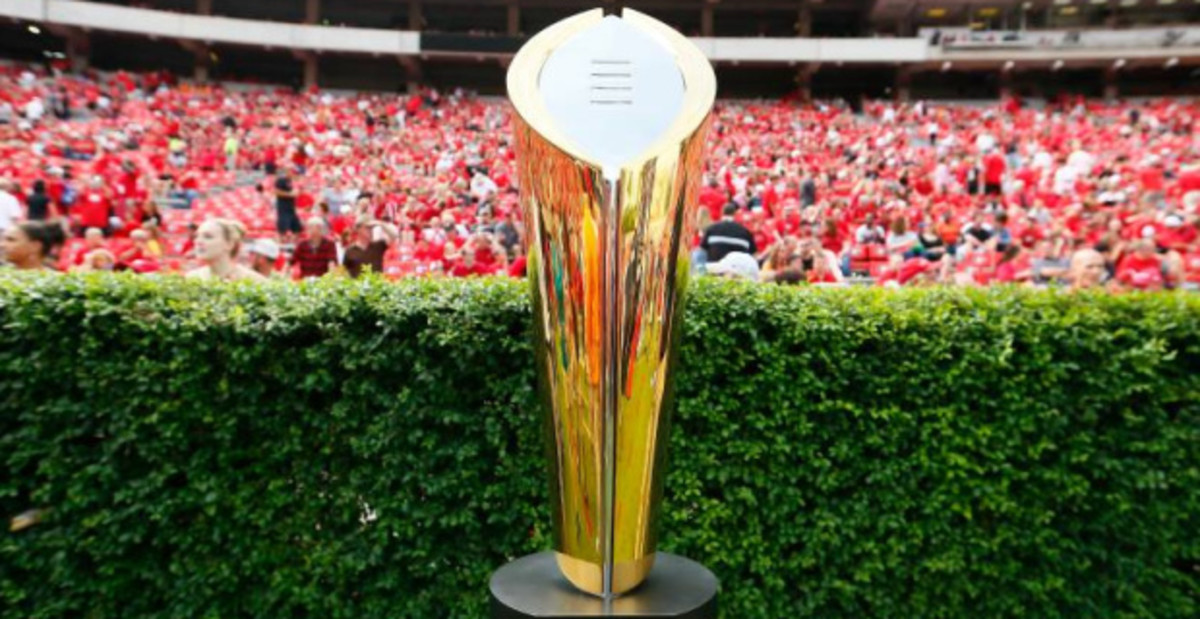
The four highest-ranked conference champions receive the top four seeds and get a first-round bye. (This rule excludes independents like Notre Dame and BYU.)
The teams ranked No. 5 through No. 12 play each other at the home stadium of the higher-ranked team. Here's a look at the proposed first-round.
No. 1 seed: Bye
No. 2 seed: Bye
No. 3 seed: Bye
No. 4 seed: Bye
No. 12 seed at No. 5 seed
No. 11 seed at No. 6 seed
No. 10 seed at No. 7 seed
No. 9 seed at No. 8 seed
Quarterfinal and semifinal games will be moved into existing bowl games. The two remaining teams will play the College Football Playoff national championship game at a neutral site.
Here's a closer look at what could have been.
2021-22 College Football Playoff

- Alabama
- Michigan
- Cincinnati
- Baylor
- Georgia
- Notre Dame
- Ohio State
- Ole Miss
- Oklahoma State
- Michigan State
- Utah
- Pittsburgh
Pittsburgh/Georgia winner vs. Baylor
Utah/Notre Dame winner vs. Cincinnati
Michigan State/Ohio State winner vs. Michigan
Oklahoma State/Ole Miss winner vs. Alabama
Winning the Big 12 would have clinched Baylor a first-round bye under the expanded format, and a date with the winner from Pitt vs. Georgia.
And we would have had at least two rematches in the Big Ten between Michigan State, Ohio State, and Michigan. In addition to a probable rematch between Cincinnati and the Irish and Alabama and Ole Miss.
2020-21 College Football Playoff
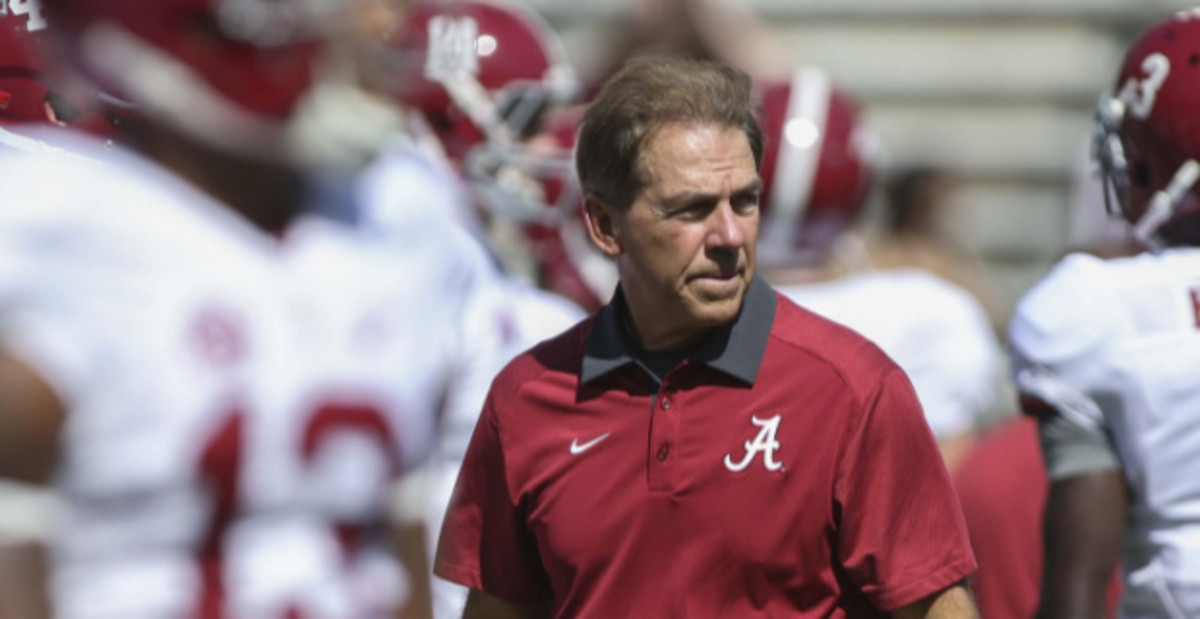
- Alabama
- Clemson
- Ohio State
- Oklahoma
- Notre Dame
- Texas A&M
- Florida
- Cincinnati
- Georgia
- Iowa State
- Indiana
- Coastal Carolina
Coastal/ND winner vs. Oklahoma
Indiana/Texas A&M winner vs. Ohio State
Iowa State/Florida winner vs. Clemson
Georgia/Cincinnati winner vs. Alabama
Bad news for the Pac-12 in this scenario. Not one of the conference's teams made it.
Not even Oregon, its champion. Cincinnati (ranked 8th) and Coastal (12th) would be the higher ranking conference champions, over the 25th-ranked Ducks.
Oklahoma would jump to fourth as Big 12 champions, instead of sixth, where they finished in the actual CFP Top 25 rankings, and earn a first-round bye.
Cincy would host Georgia in their stadium, instead of playing in the Bulldogs in Atlanta, where they did in the Peach Bowl.
2019-20 College Football Playoff

- LSU
- Ohio State
- Clemson
- Oklahoma
- Georgia
- Oregon
- Baylor
- Wisconsin
- Florida
- Penn State
- Utah
- Memphis
Memphis/Georgia winner vs. Oklahoma
Utah/Oregon winner vs. Clemson
Baylor/Penn State winner vs. Ohio State
Florida/Wisconsin winner vs. LSU
Oregon and Memphis were conference champions in 2019, in addition to the top four.
Oregon is one of two Pac-12 teams to make it that year, but there would be a rematch of the conference title game against Utah.
Auburn was in play until mid-November, but lost to fourth-ranked Georgia as the then-12 seed.
2018-19 College Football Playoff

- Alabama
- Clemson
- Oklahoma
- Ohio State
- Notre Dame
- Georgia
- Michigan
- UCF
- Washington
- Florida
- LSU
- Penn State
ND/Penn State winner vs. Ohio State
LSU/Georgia winner vs. Oklahoma
Florida/Michigan winner vs. Clemson
UCF/Washington winner vs. Alabama
One interesting rule about the proposed new College Football Playoff: Notre Dame can't have a bye week. That's because only conference champions can earn the first-round bye.
Big Ten champ Ohio State — which ranked sixth that year — would in this case jump to fourth over non-champions ND and Georgia.
The Irish went 12-0 that year, and Ohio State went 12-1 (losing to Purdue), but this rule was actually Notre Dame's idea: Irish AD Jack Swarbrick was in the working group that worked out this expansion idea.
2017-18 College Football Playoff

UCF/Alabama winner vs. Ohio State
Washington/Wisconsin winner vs. Georgia
Miami/Auburn winner vs. Oklahoma
USC/Penn State winner vs. Clemson
Alabama made the College Football Playoff that year, despite not playing in the SEC title game.
In this format, the Tide would be relegated to a first-round game at home against an undefeated UCF. And Auburn, who beat Bama and Georgia, but lost the rematch with the Bulldogs in the SEC title game, would make the CFP.
Ohio State, which ranked fifth that season, would have made it, jumping Alabama.
2016-17 College Football Playoff
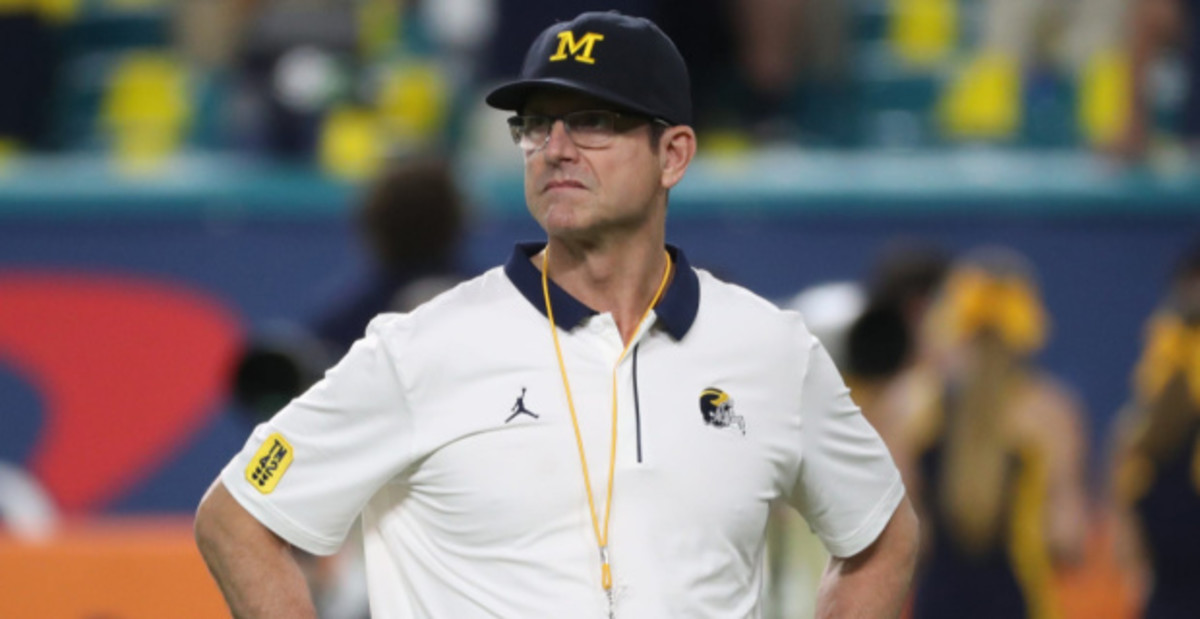
- Alabama
- Clemson
- Washington
- Penn State
- Ohio State
- Michigan
- Oklahoma
- Wisconsin
- USC
- Colorado
- Florida State
- Western Michigan
W. Mich./Ohio State winner vs. Penn St.
Florida St./Michigan winner vs. Washington
Colorado/Oklahoma winner vs. Clemson
USC/Wisconsin winner vs. Alabama
Talk about a banner year for the Big Ten. The conference has four teams in this lineup. Penn State beat OSU and then won the league with two losses.
But in real life, the CFP put the Buckeyes (who beat four ranked teams, including at Oklahoma) in ahead of PSU that year.
2015-16 College Football Playoff
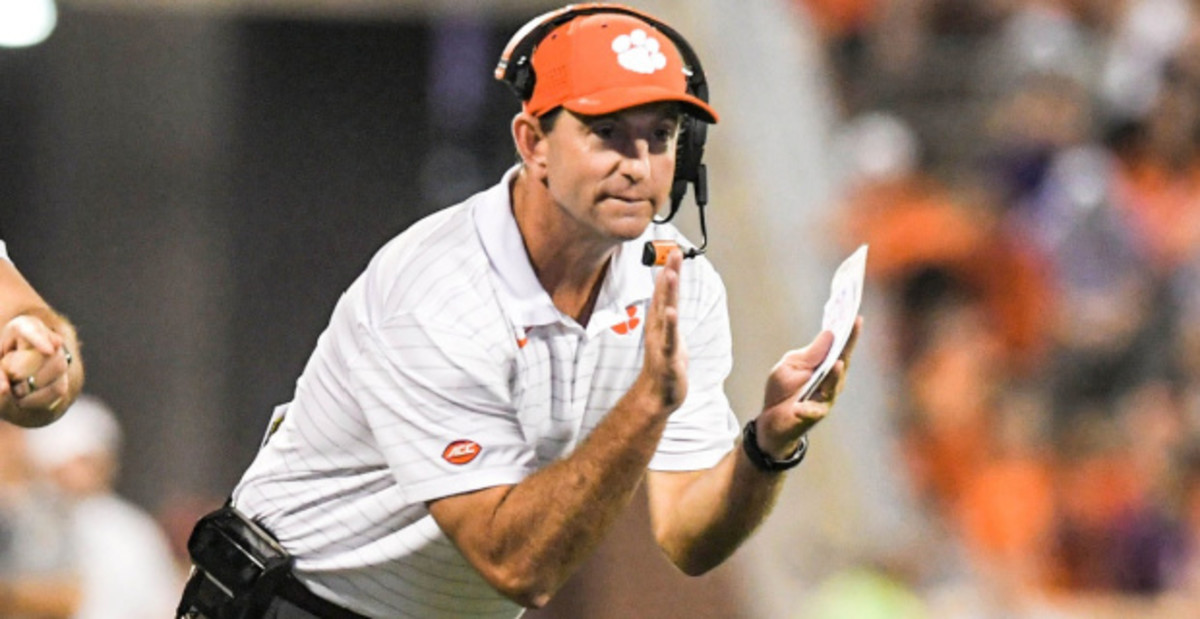
- Clemson
- Alabama
- Michigan State
- Oklahoma
- Iowa
- Stanford
- Ohio State
- Notre Dame
- Florida State
- North Carolina
- TCU
- Houston
Houston/Iowa winner vs. Oklahoma
TCU/Stanford winner vs. Michigan State
North Carolina/Ohio State winner vs. Alabama
Florida State/Notre Dame winner vs. Clemson
Ohio State fans would like this ranking after a late-season loss to Michigan State.
In reality, that game knocked OSU out of the Big Ten race and the playoff, and denied them a shot at back-to-back titles. An expanded format would also book a rematch against Alabama, who the Bucks beat in the first College Football Playoff semifinal.
2014-15 College Football Playoff
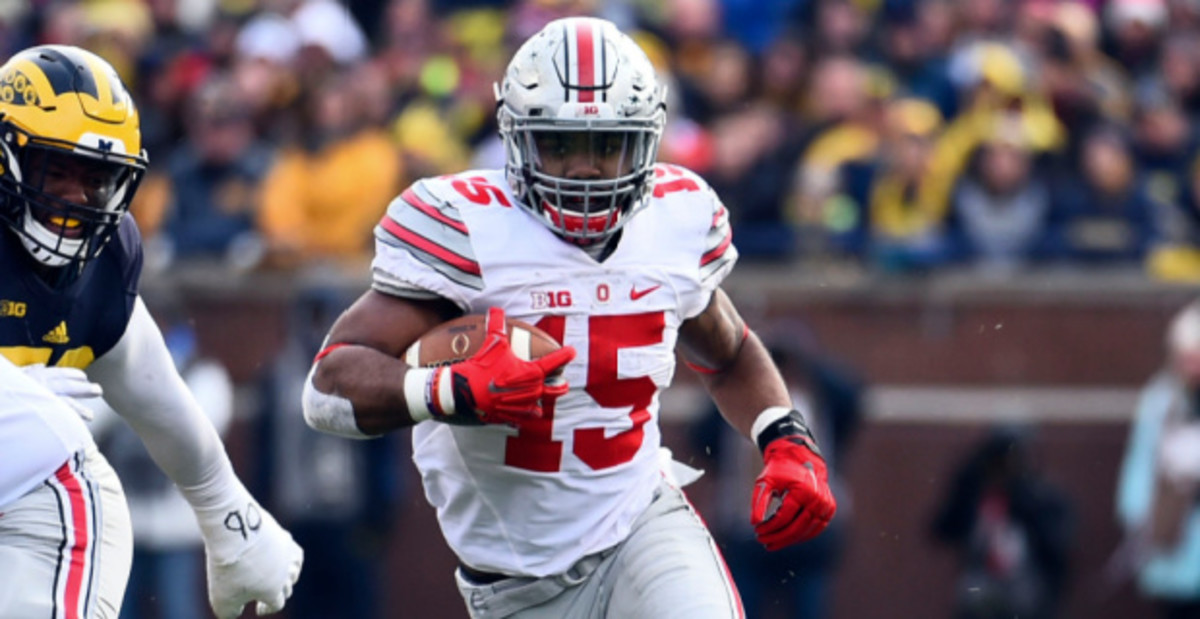
- Alabama
- Oregon
- Florida State
- Ohio State
- Baylor
- TCU
- Mississippi State
- Michigan State
- Ole Miss
- Arizona
- Kansas State
- Boise State
Boise State/Baylor winner vs. Ohio State
Kansas St./TCU winner vs. Florida State
Arizona/Miss. St. winner vs. Oregon
Ole Miss/Michigan St. winner vs. Alabama
Good look for the state of Mississippi, which gets both its major college football programs in the playoff. MSU was the top-ranked team in the first-ever CFP poll, and the Rebels were in fourth place.
But both teams had mid-season losses and fell out of contention in December.
Baylor and TCU both had one loss — TCU's was to Baylor in a shootout — but both Texas teams would have made it under this format.
Total CFP conference bids, 2014-21

In an expanded 12-team field
Big Ten: 23
SEC: 22
Big 12: 14
ACC: 13
Pac-12: 12
AAC: 6
Independent: 2
M-West: 1
MAC: 1
Sun Belt: 1
Some of the argument against CFP expansion is that the SEC would dominate even more than it has, and, yes, we certainly would see more of that conference.
But there would have been slightly more parity, too, as the Big Ten would have had the slight edge over the SEC in terms of schools earning playoff bids.
Alabama would do most of the SEC's heavy lifting and Ohio State much of the Big Ten's, but both leagues would get more schools in on the action, too.
Put together, the Big Ten and SEC would have made up over 47 percent of all College Football Playoff teams in a 12 team format. But that doesn't mean other schools wouldn't be in on the fun.
College Football Playoff bids by school

Which teams would have earned the most College Football Playoff berths? Sure, it's the usual suspects, but a lot more schools would have had some fun, too.
Big Ten
Ohio State, 8
Michigan State, 3
Penn State, 4
Wisconsin, 3
Michigan, 3
Iowa, 1
Indiana, 1
SEC
Alabama, 7
Georgia, 5
Florida, 3
LSU, 2
Ole Miss, 2
Auburn, 1
Texas A&M, 1
Mississippi State, 1
Big 12
Oklahoma, 6
Baylor, 3
TCU, 2
Kansas State, 1
Iowa State, 1
Oklahoma State, 1
ACC
Clemson, 6
Florida State, 3
North Carolina, 1
Miami, 1
Notre Dame, 1*
Pittsburgh, 1
* Notre Dame was an ACC member for football in 2020 during the Covid-19 pandemic
Pac-12
Washington, 3
USC, 2
Oregon, 2
Utah, 2
Arizona, 1
Stanford, 1
Colorado, 1
AAC
UCF, 2
Cincinnati, 2
Memphis, 1
Houston, 1
Independent
Notre Dame, 3
Mountain West
Boise State, 1
Mid-American
Western Michigan, 1
At least half of the Big Ten, Big 12, and SEC would have made the CFP at least once in this format.
Under the existing system, five programs — Alabama, Ohio State, Clemson, Oklahoma, and Notre Dame — have taken almost 80 percent of the spots in the final four semifinal.
By expanding, the College Football Playoff can head off arguably the biggest critique against it. Going forward, there will be a lot more representation in the sport's most important event.
Provided, that is, if the playoff actually does expand.
Follow College Football HQ: Bookmark | Rankings | News | Schedules | Facebook
